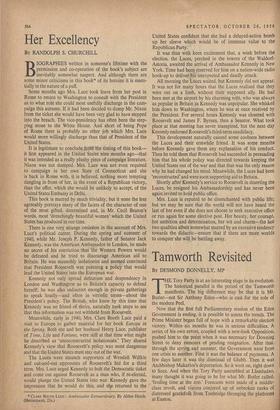Her Excellency
BY RANDOLPH S. CHURCHILL BIOGRAPHIES written in someone's lifetime with the permission and co-operation of the book's subject are inevitably somewhat suspect. And although there are some minor criticisms in this book* of its heroine it is essen- tially in the nature of a puff.
Some months ago Mrs. Luce took leave from her post in Rome to return to Washington to consult with the President as to what role she could most usefully discharge in the cam- paign this autumn. If it had been decided to dump Mr. Nixon from the ticket she would have been very glad to have stepped into the breach. The vice-presidency has often been the step- ping stone to the White House. And short of being Pope of Rome there is probably no other job which Mrs. Luce would more willingly discharge than that of President of the United States. , It is legitimate to conclude froni the timing of this book— it first appeared in the United States nine months ago—that it was intended as a really plushy piece of campaign literature. Nixon was not dumped. Mrs. Luce was not even required to campaign in her own State of Connecticut and she is back in Rome with, it is believed, nothing more tempting dangling in front of her, in the event of a Republican victory, than the offer, which she would be unlikely to accept, of the United States Embassy in Delhi.
This book is marred by much triviality, but it none the less agreeably portrays many of the facets of the character of one of the most gifted, determined and, in Mr. Cecil Beaton's words, most `drenchingly beautiful women' which the United States has produced in our time.
There is one very strange omission in the account of Mrs. Luce's political career. During the spring and summer of 1940, while Mr. Joseph P. Kennedy, father of Senator Jack Kennedy, was the American Ambassador in London, he made no secret of his conviction that the Western Powers would be defeated and he tried to discourage American aid to Britain. He was staunchly isolationist and seemed convinced that President Roosevelt was pursuing a policy that would lead the United Statcs into the European war.
Kennedy not only spread defeatism and despondency in London and Washington as to Britain's capacity to defend herself; he was also indiscreet enough in private gatherings to speak loudly—and often in vitriolic terms—about the President's policy. The British, who knew by this time that Kennedy was no friend of theirs, naturally took steps to see that this information was not withheld from Roosevelt.
Meanwhile, early in 1940, Mrs. Clare Booth Luce paid a visit to Europe to gather material for her book Europe in the. Spring. Both she and her husband Henry Luce, publisher of Time, Life and Fortune, were still at that time what might be described as 'unreconstructed isolationists.' They shared Kennedy's view that Roosevelt's policy was most dangerous and that the United States must stay out of the war.
The Luces were staunch supporters of Wendell Willkie and out-and-out opponents of Roosevelt's bid for a third term. Mrs. Luce urged Kennedy to bolt the Democratic ticket and come out against Roosevelt as a man who, if re-elected, would plunge the United States into war. Kennedy gave the impression that he would do this, and she returned to the • CLARE Boom LUCE: Ambassador Extraordinary. By Alden Hatch. (Heinemann, 21s.) United States confident that she had a delayed-action bomb up her sleeve which would be of immense value to the Republican Party.
It was thus with keen excitement that, a week before the election, the Luces, perched in the towers of the Waldorf- Astoria, awaited the arrival of Ambassador Kennedy in New York. Time had been reserved for him on a nation-wide radio hook-up to deliver his unexpected and deadly attack.
All morning the Luces waited, but Kennedy did not appear. It was not for many hours that the Luces realised that they were out on a limb, without their supposed ally. He had been met at the airport by his charming wife, who was always as popular in Britain as Kennedy was unpopular. She whisked him down to Washington, where he was at once received by the President. For several hours Kennedy was closeted with Roosevelt and James F. Byrnes, then a Senator. What took place at that meeting has never transpired, but the next day Kennedy endorsed Roosevelt's third-term candidacy.
This development naturally caused some coolness between the Luces and their erstwhile friend. It was some months before Kennedy gave them any explanation of his conduct. Then he told them that Roosevelt had succeeded in persuading him that his whole policy was directed towards keeping the United States out of the war and that that was the only reason why he had changed his mind. Meanwhile, the Luces had been `reconstructed' and were soon supporting aid to Britain.
Shortly after Kennedy's service to Roosevelt in deserting the Luccs, he resigned his Ambassadorship and has never been again invited to hold public office.
Mrs. Luce is reputed to be disenchanted with public life; but we may be sure that the world will not have heard the last of her even if she does not choose to seek executive office or run again for some elective post. Her beauty, her courage, her ambition and determination, her wit and charm—the last two qualities albeit somewhat marred by an excessive tendency towards the didactic—ensure that if there are more worlds to conquer she will be battling away.










































 Previous page
Previous page